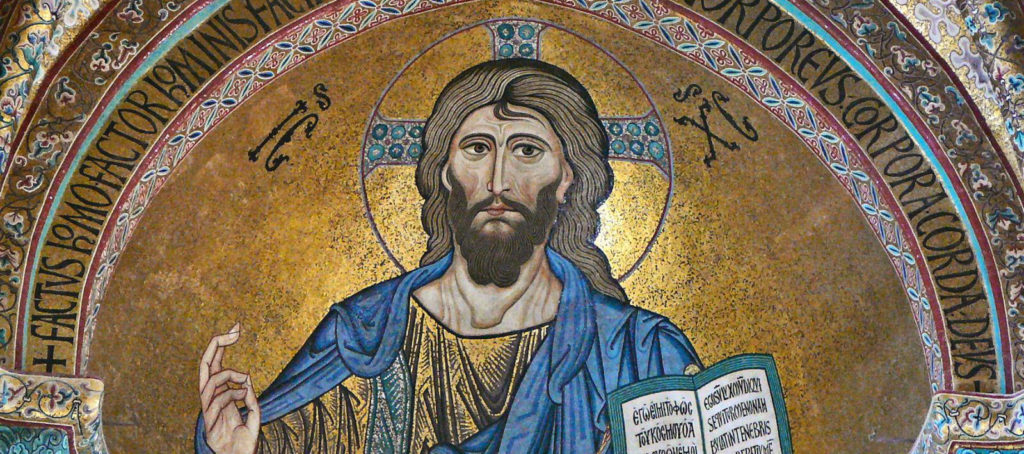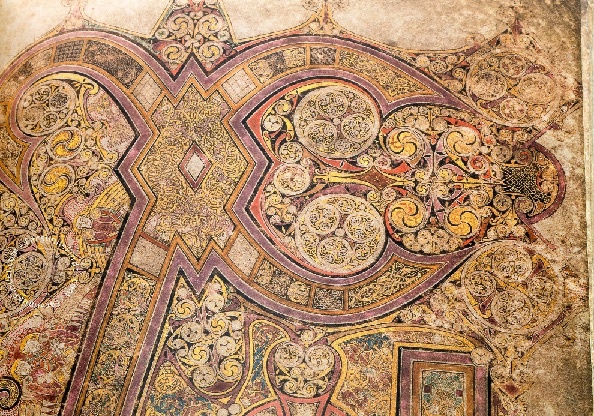
Daniel 7:9-10, 13-14
Psalm 93
Revelation 1:4b-8
John 18:33-37
Click here to access these readings.
Today is the last Sunday of Pentecost. And while it’s the last day of the long season of green, and your bulletin inserts have the same green header as we’ve had since spring, and it says “Last Pentecost” on the top – you’ll notice that our color today is white. That’s because today is the feast of “Christ the King Sunday.” This feast is celebrated on the last day of Pentecost, whenever that day falls. It’s a pretty recent addition to the church year; Roman Catholics started the feast in 1925, and we Anglicans (along with Lutherans and some other Protestants) only adopted it in the 70s. And while it’s a young feast, I think it’s an important one; it asks us to pause and to think about what kings are.
They’re all over the Bible, and Jesus is the King of Kings, but in our world today, we don’t see many kings. There are the royals in Britain – Queen Elizabeth II, William and Kate, and the rest. And while Queen Elizabeth is certainly a queen and in line with all other kings of Britain before her, she doesn’t have much political power. Then, there are medieval kings we might see in movies or read about in books. These kings are powerful, have an iron grip on their kingdom, and often do so with an iron fist. But, in truth (I’m sorry to ruin it), most of the kings we see in movies are more fantasy and romance than reality. People didn’t run around in full armor all the time.
Kings are pretty distant to us Americans. And that is, in a large part, because we threw out our king in the Revolutionary War. The colonists were being oppressed with heavy taxation by a king who lived a whole lifetime away across the Atlantic Ocean. Colonists wanted to rule themselves, to have a country of the people, by the people, and for the people. They wanted to make their own choices when it came to their government, and so they revolted and founded what we now know as the United States. Thinking of our history, we might rightly wonder whether we need a king at all, even in religion. Perhaps, we might say, kings were just a good metaphor in Jesus’s time, but now, for us, who know better than to have kings, we should find different metaphor. Maybe like “Christ the President” or “Christ the Head Hancho” or “Christ the guy in charge.”
But we have to be cautious, of course, of getting rid of things in the past because they might not speak to us in our modern day. There are times when turning away from the past is important, both in our communal life and our personal lives. There are some things that we should, certainly, put behind us and forget about. Our government does this with diplomacy: although we fought a war against Great Britain, we’ve put that past behind us so we can work for the good of one another and of the world. Our churches do this too: Anglicans used to really not like Roman Catholics (this is an understatement, to be sure!), but two Sundays ago, we not only gathered together at Holy Name Catholic Church, but with all the other churches in Coquille for an ecumenical service. We put our past fights behind us so that we could glorify God in some semblance of what the Church should be.
But there are many things in the past that we shouldn’t forget: things like veterans and the wars they fought in, or difficult times in our country’s history like the Civil Rights movement. And we remember them not just to lightly smile at and pat ourselves on the back that things are perhaps better now. No, we remember because in these moments our country and we ourselves learned something and grew. We gained wisdom in going through those difficult times, and it is good to look back and revisit that wisdom. Often we’ve forgotten it.
So, enough of an old history buff’s lesson on why we should love history. What about this kingship thing? Why do we still refer to Christ as King? Why do we talk about Christ’s kingdom instead of use some other image or metaphor?
We have to remember, though, that when we balk at the idea of a king, when we hear “king” and translate it in our heads to “tyrant”, we’re not alone. The people of Jesus’s day had seen their fair share of tyrants. The Jewish people, throughout their whole history from their first king Saul down to the emperor in Rome, had know what it was like to be under the thumb of a tyrant. This is why, for some, the Messiah was supposed to be a great military leader who came and destroyed all the tyrants. The Messiah was supposed to come in power and might, and when they looked at Jesus, they probably laughed and said, “Yeah, like this guy can stand up to Rome. Where’s the real Messiah?” And they said this not because they had a fanciful image of kings but because they had seen so many kings mess up.
So when you think of kings, and of Christ as our king, I want you to think of this image: when we were kids, my neighborhood friends and I used to play a lot of baseball. We played in my friend’s backyard, and this friend had a dog named Tess. Now Tess was a sheep-dog, not by training but by breeding. I don’t think Tess ever saw a sheep in her life, but herding sheep was in her bones. So, instead of white fluffy animals, she had us kids to tend. And whenever we played baseball, she would run around the whole field, circling us, nonstop. The poor dog never stopped running. And when we hit a ball out of the field, be it into a neighbor’s yard or into the woods, and someone had to go and get it, Tess would follow us and bite at our feet. She’d shove and push and bite us until we got back into the field with the ball. Then she’d run around and around us again.
Now as kids, we thought this was annoying. Tess would mess up our shoes and, often, really hurt us when she bit us. But what was she doing? She was protecting us, she thought, from wolves. For shepherds, like sheep dogs, are there to protect their sheep, to guide them through difficult terrain, to go out and seek those who are lost and alone. And a king isn’t supposed to do this just for sheep, but for his people: to guide them through tough times, to teach them and nurture them, and every once in a while give them a firm look to let them know they’re serious.
And isn’t this what Christ does for us? We who are so scattered and wayward, hasn’t Christ gone out into the wild of the world and gathered us all together, too? Hasn’t Christ brought us out of the hazardous lands of Sin and Death and given us New Life in his flock that we call the Church? And doesn’t Christ continue to teach and to guide us, to run around us like a sheep dog, to protect us; and, when we err, to come and seek us out so that we may rejoin his people?
And for these reasons, and many many others, we give him honor and praise and our loyalty. We turn to Christ not because he commands authority like some tyrant, but because to him, and to him alone, should we train our hearts. Christ is a king, though a king that is also a shepherd, a sheepdog, a lamb, a Son, and a brother. Christ is the king of our lives, of our journey in this world, of our relationships and our communities, of our hearts, and of all our deepest loves. In all things we turn to Christ who gives us the rule of faith. And his throne is the cross. And his decrees are love and hope and joy in God. And his kingdom is life, life everlasting.
Christ is a king – no other metaphors will do. For in God’s kingdom are all our hopes. In God’s hands is all our love, in a great world of joy that has no end.


